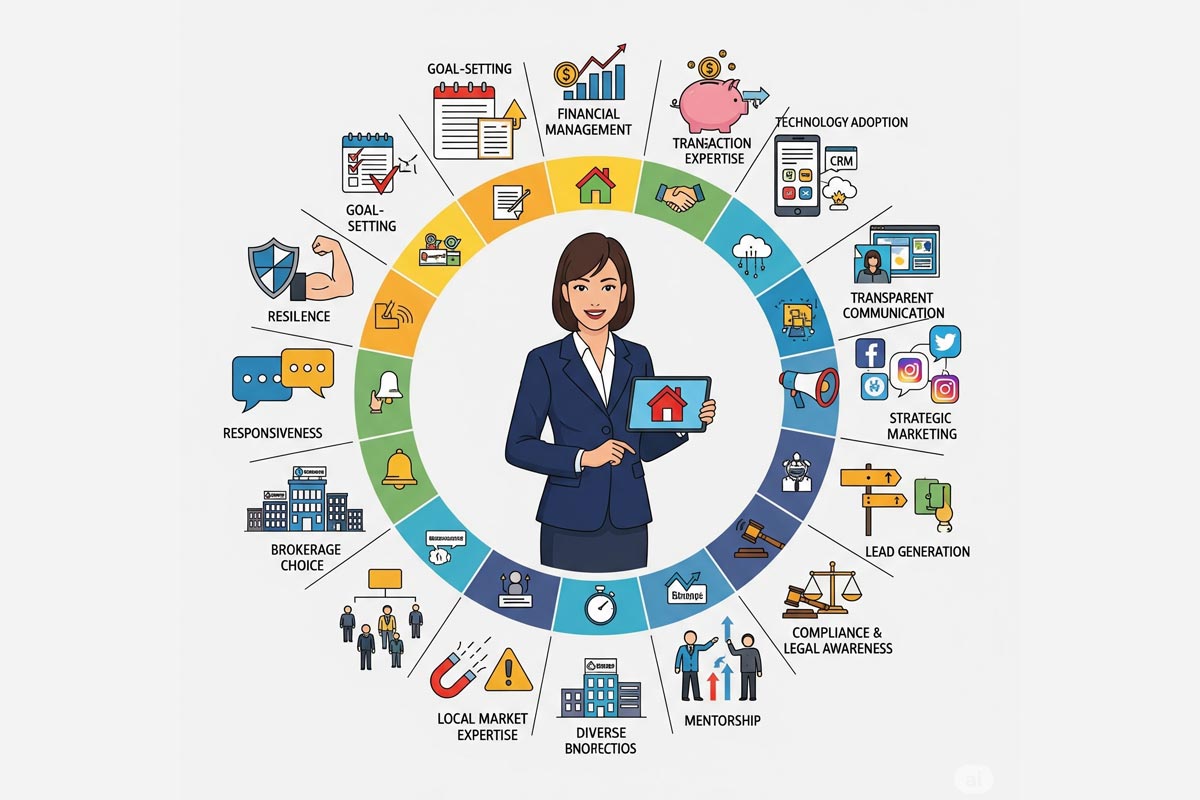
You've enrolled in our real estate license school, studied diligently and successfully passed your real estate exam —congratulations! Many people mistake this license for the finished product, but it’s more accurate to think of it as the plot of land on which you will build your career. It grants you the legal right to build, but the land is currently empty - Now, it's time to build the house.
Transitioning from a newly licensed professional to a fully thriving one requires shifting from a student's mindset to that of a business owner. The reality of real estate can be challenging, but with the right skills and strategies, you can position yourself for lasting success.
Here are 13 essential and actionable skills every new real estate agent should master.
1. Set Clear Goals and Action Plans
In a commission-only profession, you are your CEO. Without a boss setting deadlines or a guaranteed paycheck providing structure, it's easy to drift. Setting clear, measurable goals moves you from a reactive to a proactive state, giving you a roadmap and a way to hold yourself accountable. Establish specific targets for client outreach, open houses, and social media engagement, reviewing your progress regularly to make necessary adjustments.
Action Step: Utilize goal-setting tools, such as the SMART (Specific, Measurable, Achievable, Relevant, Time-bound) framework for setting goals and don’t be afraid to use technology to track your progress.
2. Build a Financial Cushion and Manage Income Wisely
Real estate commissions fluctuate dramatically, and it's not uncommon for a new agent to take 3-6 months to close their first transaction. A financial cushion is not a luxury; it's a foundational business tool that allows you to make decisions from a position of strength, not desperation. This prevents you from taking on bad clients or making poor long-term choices to get a quick commission check.
Action Step: Use budgeting tools and automate monthly deposits into a separate savings account to build your emergency fund.
3. Embrace Technology for Efficiency
As a solo agent, your time is your most valuable asset. Technology provides leverage, enabling you to automate repetitive tasks and manage more clients than would be possible manually. A good Customer Relationship Management (CRM) system acts as your digital assistant, reminding you who to call and when, while other tools can streamline your marketing, freeing you up for income-producing activities.
Action Step: Invest in free or low-cost online tutorials to master key real estate tech tools, such as your CRM and a social media scheduler.
4. Develop Emotional Resilience
Rejection is a daily reality in real estate—offers get denied, buyers change their minds, deals collapse in escrow, and potential clients choose a different agent. Resilience isn't about not feeling disappointment; it's about processing it quickly and not letting one setback derail your momentum for the entire week. Viewing each "no" as data or a learning experience is key to long-term survival and motivation.
Action Step: Regularly engage with resources—such as books, articles, or talks—that focus on building resilience and developing a growth mindset to persevere through challenges.
5. Acquire Transaction Process Expertise
Your licensing exam taught you the law, but it can’t teach you the practical flow of a deal. Actual expertise means understanding the intricate dance between lenders, appraisers, inspectors, title officers, and the opposing agent. Knowing what happens when, who is responsible for what, and how to anticipate and solve problems is what makes you an invaluable guide for your clients.
Action Step: Attend continuing education seminars and workshops, and establish relationships with experienced professionals in related fields who can provide answers to your questions.

6. Honest and Transparent Communication
Trust is the currency of real estate. Many new agents, to please, are tempted to overpromise on a home's potential sale price or understate the market's challenges. This strategy inevitably backfires. Setting realistic expectations from the beginning, even when the news is not what the client wants to hear, builds a foundation of trust and establishes your reputation as a credible, honest professional.
Action Step: Create scripts or templates for common communications, such as market updates and negotiation strategies, to ensure you are always transparent and consistent.
7. Strategic Marketing on a Limited Budget
Effective marketing isn't about having the most significant budget; it's about having the most innovative strategy. The goal is to establish your brand as a knowledgeable, trustworthy local authority. Consistently providing value—through neighborhood highlight videos, blog posts on the buying process, or community event updates—attracts clients to you, shifting the dynamic from chasing leads to creating inbound opportunities.
Action Step: Plan your marketing with a quarterly content calendar and track your results using analytics tools to see what resonates with your audience.
8. Master Quick Responsiveness
In a world of on-demand everything, clients expect prompt communication. A quick response, even if it's to say, "I've received your message and will get back to you with details this afternoon," signals that you are professional, attentive, and that they are a priority. In a competitive situation, your responsiveness can be the single factor that makes a client choose you over another agent.
Action Step: Enable smartphone notifications for business inquiries and use apps like WhatsApp Business or Slack for efficient client interactions.
9. Understand Your Local Market Deeply
Online portals can provide anyone with data; your value lies in offering insight. Deep market knowledge means understanding the nuances that algorithms can't—why one side of the street is more valuable than the other, the reputation of local builders, upcoming zoning changes, or the traffic patterns around a specific school. This is the irreplaceable expertise that clients are paying for.
Action Step: Subscribe to local news alerts, regularly review new MLS listings and recent sales, and attend local open houses to deepen your firsthand expertise.
10. Choose the Right Brokerage
Your choice of brokerage is one of the most profound decisions for your career trajectory. This is your foundational support system. A brokerage isn't just a name on your sign; it dictates your training, access to mentorship, commission structure, and the overall culture you work in. Some larger brokerages offer brand recognition and extensive tools, while smaller boutique firms may offer more hands-on guidance.
Action Step: Conduct informational interviews with managers at multiple brokerages to evaluate their value proposition and identify the best fit for your career goals.
11. Master Lead Generation Techniques Lead generation is the engine of your business and the most direct income-producing activity you can perform. Successful agents do not passively wait for business to come to them; they build and work systems to make the phone ring. Whether you focus on your existing network (SOI), a specific neighborhood (geographic farming), or online ads, dedicating non-negotiable time to prospecting is essential.
Action Step: Schedule regular lead-generation activities into your calendar, like weekly SOI outreach calls, monthly neighborhood mailings, or regular participation in local community events.
12. Navigate Compliance and Legal Pitfalls
A real estate license gives you the power to handle what is often someone's most significant financial asset. That power comes with immense responsibility. A single mistake on a contract, a missed disclosure, or a violation of fair housing laws can result in a lawsuit that ends your career and damages your reputation. Meticulous attention to legal detail isn't optional; it's the bedrock of a professional practice.
Action Step: Regularly review your state's real estate regulations, participate in legal compliance workshops, and consult with your broker or an attorney for complex transactions as needed.
13. Find a Mentor or Join a Team
Real estate can be an isolating "every person for themselves" business, but it doesn't have to be. Joining a team or finding a mentor accelerates your learning curve exponentially. It allows you to learn from the successes and mistakes of others, provides a sounding board for difficult situations, and offers a collaborative environment to help you close your first deals with confidence.
Action Step: Actively seek mentorship through your brokerage or attend local real estate association events to connect with experienced professionals who are willing to share their knowledge.
By mastering these 13 actionable skills and strategies, you'll be far better equipped to overcome the inevitable challenges, build a sustainable and profitable business, and truly thrive as a real estate professional.
Love,
Kartik
California Real Estate License Delays: How to Pass DRE Education Verification Fast
Holiday Home Sales: A Hidden Opportunity for Agents
What Happens When the DRE Denies Your License (and How to Fight Back)
Out-of-State Agents: Transferring a Real Estate License to California
Understanding DRE Form RE 226: How to Verify Your Experience for a California Broker’s License

Founder, Adhi Schools
Kartik Subramaniam is the Founder and CEO of ADHI Real Estate Schools, a leader in real estate education throughout California. Holding a degree from Cal Poly University, Subramaniam brings a wealth of experience in real estate sales, property management, and investment transactions. He is the author of nine books on real estate and countless real estate articles. With a track record of successfully completing hundreds of real estate transactions, he has equipped countless professionals to thrive in the industry.